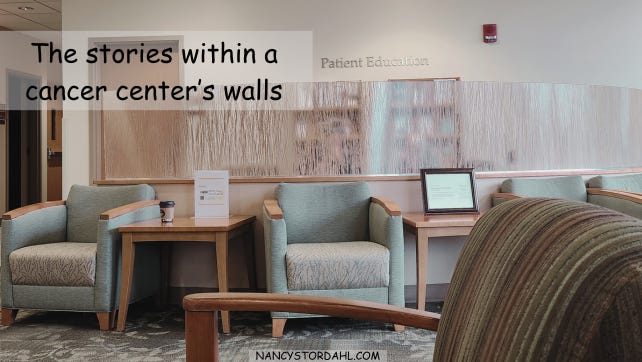"Unremarkable" & the stories within a cancer center's walls
The waiting room is filled with patients — each with a story all their own.
Hello, friend.
If you’re new here, welcome! New or not, I appreciate your readership more than I can express.
I hope you enjoy this week’s read. I look forward to reading your thoughts and perhaps a bit about your story.
Unremarkable & the stories within the cancer center’s walls
Recently, I had my annual oncology checkup. It was uneventful. Boring even. Yay for boring! When your tests/scans/reports are deemed unremarkable, it is indeed something to celebrate and be grateful for.
It’s weird to think being unremarkable is fantastic — exactly what you want to be. I’m thrilled to be unremarkable. Unremarkable has become something good to be.
I am unremarkable. I’ll take it.
Cancer is good at mixing things up like that. Turning lives upside-down and inside out. Making words like “unremarkable” words we love to hear.
And, there is also NED (no evidence of disease). I am that too. These days, most oncologists don’t deem a patient like me cured. NED is safer. More accurate. I like being NED. I’ll take that semi-noncommittal term too.
When I go to oncology appointments now — 14 years post diagnosis — I feel like an outsider. I feel out of place in the Cancer Center. Awkward even. Like I don’t belong there anymore, but yet I do. I always will.
These days, I have one foot in the land of the healthy, and the other remains caught in the revolving door of Cancer Land. Try as I might to shake that stuck foot free, it’s not really possible, and it likely never will be. Once you’ve heard those words, you’re never free. Not completely anyway.
Cancer is a type of forever bondage. That’s just the truth. Well, mine anyway.
My medical chart will forever be filled with cancer stuff and lots of it.
One thing remains the same when I go to oncology appointments:
The waiting room is filled with patients — each with a story all their own.
This fascinates me, or rather those stories do.
While I wait for my name to be called, I sit and wonder about those stories.
Doing so is way more interesting than scrolling on my phone. Though, admittedly, I do plenty of that as well. Doesn’t everybody?
But first, I think about my own story, my first experience within the Cancer Center walls. I had no clue what was ahead back then. Well, that’s not true. My mother’s story was fresh in my mind. But my story was just beginning to unfold; there were volumes yet to be written. In hindsight, I realize not knowing too much at the start was probably better.
Next, and as inconspicuously as I can, I study the faces of the folks sitting in the waiting room chairs attempting to gauge each patient’s age, cancer type, stage of treatment, and how sick they appear to be. Head covers are giveaways. Scarves, beanies, and other head gear shout chemo. Wheel chairs and walkers signal loss of mobility and independence. A sallow complexion indicates malaise. All of these things together equal not doing so well.
Some signals and clues are harder to read.
I make weight-loss assessments (not proud to admit this one, but I do it), and study demeanor of not just the patients, but also partners and other support people accompanying each patient. Of course, some folks sit alone. Some by choice. Some not.
It’s human nature to compare when you’re sitting in a Cancer Center waiting room. This is what I tell myself anyway.
One quickly figures out who looks the sickest and most frail. Not that looking sick and frail is even a reliable indicator of how sick a person actually is. It’s not.
Then again, sometimes looking sick means exactly that — the person is really sick.
After my eyes finish that first scan of the room and the faces, and if there’s time, I think about the story each patient carries and wonder where their story will lead them today.
Who is about to get bad news? Who, like I was, will be diagnosed with breast cancer and face a bilateral mastectomy? Who will get sent to the fifth (or whatever) floor to meet with a plastic surgeon to talk about reconstruction and have silicone implants handed to her as if it's no big deal to contemplate them being replacements. Who will be expected to make life-altering decisions within a matter of days or even less time than that? Who is there for chemo or radiation, and who is smiling way too much through all of it trying to put up a brave front?
Who is at the beginning of her cancer chaos and who is nearing the end?
The stories are many and varied, and yet, there is likely much that is also the same in each one. A common thread or two. I’ll never know the details of any of those stories; and yet, I likely know some of them.
Because…
I’ve been where some Cancer Havers are today. I’ve sat in the same waiting room chair. I’ve heard bad news, good news, and scary news. I’ve been handed those gummy bear implants, too. I’ve seen the charts depicting the benefit of chemo and hormone therapy vs opting out. I’ve had my chest drawn on with markers mapping out an entirely new landscape. I’ve cried behind those closed doors while trying to process impossible news.
And yes, I’ve been told there is no more to be done for my loved one.
Though our stories are all different, there are similarities, too. That’s why there’s an invisible bond amongst Cancer Havers. An understanding. A knowing. An empathy.
Our stories are all different and yet, intertwined as well. Again, there's that common thread.
Today, my story continues. The future isn't a given. It never is. But I am still here.
I’m grateful for my unremarkableness. I'm grateful to remain NED.
And yes, I'm still a bit angry about all of it. I'm okay with anger bubbling up from time to time, and I feel no need to stomp it out or apologize when it does. I believe this is healthier than stifling it or pretending cancer is just a bump in the road. It’s way more than that.
And it sure as heck is no gift.
Though I know fully well it will not be true for everyone within the waiting room walls, the thing I wish most for each of them today and every day is to be and remain unremarkable.
Do you ever think about the stories within any waiting room’s walls? (Or is it just me?)
What helps you pass the time (and decrease anxiety) while you wait for an appointment?
If applicable, when did your (or your loved one’s) cancer story begin?
Above photo by Greg Rosenke on Unsplash. The featured one was taken in my cancer center.
A shout out to fellow Substacker
whose recent article, When a Heart Has Known the Waiting Room, helped inspire this post.Don’t forget to visit my author website when you get a minute.
If you like this post, thank you for liking and/or sharing it!
Commenting on my post encourages others to do the same and helps get conversations rolling.
Read more about my cancer story in my memoir, Cancer Was Not a Gift & It Didn’t Make Me a Better Person, available on Amazon and other booksellers. No sugarcoating. Guaranteed. Let me know if you find any common threads to your story in it.
Have a great rest of your week!
Thank you for being here with me. Your support helps motivate me to keep writing.
As always, I see you. I hear you, and I care about what you have to say.
Until next time and with gratitude,
Nancy






This is such a thought-provoking post, thank you! I am/was a caregiver to my husband who passed last December from glioblastoma after a 9-month battle. As we sat in many waiting rooms for multiple treatments, I too watched others. Very specifically, during his radiation treatments, I found myself wanting to talk to each caregiver and patient-to ask some of these very questions you pose. I was looking for some bit of data that I could apply. I was looking for reasons to say “oh, I’m so sorry for what you’re experiencing” while secretly thinking thank God that’s not us! (I’m not proud of this, by the way). I was looking for hope. And to keep it alive.
Thank you for your story. Thank you for your vulnerability. And thank you for writing. Many prayers and good vibes being sent for your continued NED and for being unremarkable.
Hi Nancy, this post blew me away. It includes exactly what I think when I am in my oncologist's waiting room. In fact, your waiting room looks so much like mine, I thought it was mine!
First of all, I'm so glad you are unremarkable. As you know, a cancer diagnosis introduces a whole lot of turbulence in our lives. Turbulence that one never wants to ever go through again. In fact, for me and I'm sure many cancer havers, we have that psychological turbulence that remains even if we're in NED world. I get a lot of psychotherapy and take psych meds for my PTSD. The great thing is that both treatments have worked beautifully, and I live a remarkably unremarkable life because of my seeking out the help I need and deserve.
Like you, I'm an astute observer of people, and when I am in the oncologist's waiting room, I always think of the stories of the people I see there. Are they going to die? Maybe she's in a wheelchair during treatment, but maybe she will be OK eventually. Which one of that couple has cancer? What is the prognosis of that guy? The problem for me is I think too much of others' stories, and that, in turn, makes me vulnerable to a panic episode. And then I go into the examination room a mess.
And then I think of my oncologist's stories. How many people did he have to tell they had Stage IV disease? How does he cope with the bad news he must give patients? How elated is he when a patient has a good prognosis?
And being unremarkable myself, which I am grateful for, why do I feel survivor's guilt?
Anyway, as you can see, your post gave me a lot to think about. Thank you for writing it.